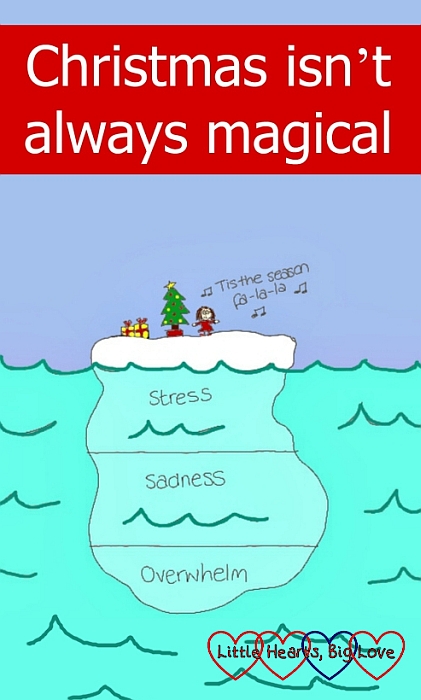As the year draws to a close we can often find ourselves in a reflective place. If we are feeling low due to the festive period, this can create low mood perhaps due to thinking back to past years with family or friends who may no longer be in our lives. For many people the winter period can also cause them to struggle due to the lack of sunlight and suffering from Seasonal Affective Disorder (“SAD”). It can be more difficult to motivate ourselves to get up and go outside due to the weather and lowered temperatures and those who struggle with chronic pain can find this a particularly challenging time of the year. As non-emergency health services are suspended leaving emergency care only, people with health conditions can also struggle to get the help they need and this can cause additional worries for them and their families.
Sadly for many the festive season can be a stressful and isolating time. If we are already struggling with low mood, anxiety or relationship issues holding the belief that this is/or ‘should be’ a happy time can cause us to feel worse. People struggling with addiction, debt, gambling or eating difficulties often find that the festive period is a time when their feel more at risk of spiralling and relapsing.
How to help ourselves?
If we are in a reflective space consciously work to reflect on positive things that have gone well for us in the last 12 months and search for positive memories of times we have enjoyed. Perhaps watching children play in a park in the sunshine, sharing a meal with a friend sitting outside. Focus on connecting with the positive emotions a memory generates and concentrate on your body sensations linked to this memory ie warmth on our skin, feeling the muscles on our face when smiling. Spending time allowing our mind to go back in our memory bank to focus on positive memories helps us to release positive hormones such as serotonin. When we imagine a positive experience where we feel valued, loved and appreciative our brain produces serotonin whether we are remembering a real memory or using our imagination.
We probably know that exercise also releases serotonin but we may find it hard to motivate ourselves to do it. Procrastination is a common issue that clients bring to us. When we achieve something and feel good about ourselves we can increase our dopamine activity. Dopamine is also linked to rewarding ourselves through money, comfort food and winning. Sadly, the need for dopamine can mean we could be a risk of over-eating certain foods, overspending or perhaps engaging in activities such as gambling or excessive online gaming. Setting a healthy goal for each day and breaking down larger goals into achievable chunks. Pause and reflect as you achieve each part of the goal and allow yourself to feel proud of your achievement. Sharing goals with others not only increases the likelihood of achieving them but sharing our success along the way also maximises our dopamine levels.
This needs to be balance for those who are driven to over-achieve which can become a punishing activity. Like perhaps someone who does an intense work out at the gym every day irrespective of whether they are feeling well or not. Like everything in living a healthy life balance is key.
Listening to music can also be a way to more passively increase our dopamine levels. When we feel strong emotions connected to certain music such as a feeling down our spine like ‘chills’ we are more likely to be releasing dopamine. We may get this when we attend a live music event.
Looking ahead to the new year
We can sometimes look back over the last year with regret and a sense of not having accomplished what we wanted to. Setting new year’s goals are not always positive for people. It may be better to set goals on a weekly or monthly basis and choose things which we genuinely belief are achievable.
When we look back over the last year reflect on what we have managed to achieve, even if that’s sometimes acknowledging that instead of making vast improvements we have plateaued. Achieving a status quo result is far better than something deteriorating. Look back on moments when we have felt contentment, relaxed even if we can’t always say that each week has been filled with joy. Think about how we have coped well with situations that perhaps we have struggled previously with and could have caused a setback in the past.
Overleaf is a list of helplines and places to access support. Also remember to look at your local Council website for details of local support groups and foodbanks open over the festive season.
Please contact us if we can support you with individual therapy or our group workshops at email: wellness-consultancy@outlook.com.
Best wishes to you for 2025 from Rachel, Andrea and Helen.
Rachel Wesley
Support lines
Age UK (England)
0800 678 1602
ageuk.org.uk
Information and support for older people
Age UK’s English helpline is open 8am to 7pm, every day of the year
Age Cymru (Wales)
0300 303 44 98
ageuk.org.uk/cymru
Information and support for older people in Wales.
Age UK advice on coping with low mood over winter is available on the website
Alcoholics Anonymous
Call free 0800 917 7650, email help@aamail.org
https://www.alcoholics-anonymous.org.uk/
Beat
0808 801 0677 (England)
0808 801 0433 (Wales)
beateatingdisorders.org.uk
Offers information and advice on eating disorders, and runs a supportive online community. Also provides a directory of support services at HelpFinder
Beat’s helplines are open Monday to Friday 3pm to 8pm.
Beat’s answers to five questions you may have about Christmas with an eating disorder is available on their website
Campaign Against Living Miserably (CALM)
0800 58 58 58
thecalmzone.net
Provides a helpline and online chat, as well as information and support, for anyone affected by suicide or suicidal thoughts.
CALM’s helpline and webchat are open from 5pm to midnight, every day of the year.
CALM’s advice on coping with feeling anxious at Christmas
Combat Stress
0800 1381 619
combatstress.org.uk
Treatment and support for armed forces veterans who have mental health problems.
Combat Stress’s helpline is open 24 hours a day, every day of the year. Combat Stress’s tips on coping with Christmas is available on their website
The Compassionate Friends
0345 123 2304
tcf.org.uk
Provides support to bereaved families after the death of a child.
The Compassionate Friends helpline is open from 10am to 4pm, and 7pm to 10pm, every day of the year. The Compassionate Friends’ tips for coping with Christmas is available on their website
Cruse Bereavement Support
0808 808 1677
cruse.org.uk
Information and support after a bereavement.
The Cruse helpline is open Monday to Friday, from 9:30am. The closing time varies per day, from 5pm to 8pm. You can check Cruse’s helplines page for more information about their opening hours. Cruse’s information on coping with grief at Christmas is available on their website
Gamblers Anonymous
https://gamblersanonymous.org.uk/
0330 094 0322
LGBT Foundation
0345 3 30 30 30
https://lgbt.foundation/
Advice, support and information for people identifying as LGBTQ+.
The LGBT Foundation helpline is open on weekdays 9am to 9pm and weekends 10am to 5:30pm.
Men’s Advice Line
0808 801 0327
mensadviceline.org.uk
Confidential advice and support for men who have experienced domestic violence and abuse by a current or ex-partner or family member.
The Men’s Advice Line is open Monday to Friday, 10am to 5pm.
MoneyHelper
0800 138 7777 (English)
0800 138 0555 (Welsh)
18001 0800 915 4622 (text relay)
moneyhelper.org.uk
Provides free and impartial money advice.
The MoneyHelper helpline is open Monday to Friday, 8am to 6pm. The helpline is closed on bank holidays.
Money Helper’s information on money, saving and Christmas
Narcotics Anonymous
https://ukna.org/
NA Helpline is open from 10am until midnight, seven days a week
NA HELPLINE: Call 0300 999 1212
The National Association for People Abused in Childhood (NAPAC)
0808 801 0331
support@napac.org.uk
napac.org.uk
Supports adult survivors of any form of childhood abuse. Offers a helpline, email support and local services.
The NAPAC helpline is open 10am to 9pm, Monday to Thursday. And 10am to 6pm on Fridays.
NAPAC’s advice on surviving Christmas as a survivor
National Domestic Abuse Helpline
0808 2000 247
nationaldahelpline.org.uk
Free 24-hour helpline for women who have experienced domestic abuse and violence, with all female advisors. Also offers a live chat and can help to find refuge accommodation. Run by the domestic violence charity Refuge.
The National Domestic Abuse Helpline is open 24 hours a day, every day of the year. They also have a BSL helpline available Monday to Friday, 10am to 6pm. And a live webchat open Monday to Friday, 3pm to 10pm.
NHS 111 (England)
111
18001 111 (text relay)
NHS 111 BSL service
111.nhs.uk
Non-emergency medical help and advice for people in England. If you call 111, select option 2 to access a 24/7 helpline offering urgent mental health support.
NHS 111 (Wales)
111
111.wales.nhs.uk
Non-emergency medical help and advice for people living in Wales. If you call 111, select option 2 to access a 24/7 helpline offering urgent mental health support.
NHS 111 is open 24 hours a day, every day of the year.
NHS UK
nhs.uk
Information about health problems and treatments, including details of local NHS services in England
NSPCC
For anyone worried about a child
0808 800 5000
www.nspcc.org.uk
Papyrus provides confidential support and advice to young people
struggling with thoughts of suicide, and anyone worried about a young person
Telephone: 0800 068 4141
https://www.papyrus-uk.org/
Relate
relate.org.uk
Provides help and support with relationships, including counselling and telephone support.
Relate’s information on relationships and Christmas is available on their website
Samaritans
116 123 (freephone)
jo@samaritans.org
Freepost SAMARITANS LETTERS
samaritans.org
Samaritans are open 24/7 for anyone who needs to talk. You can visit some Samaritans branches in person. Samaritans also have a Welsh Language Line on 0808 164 0123 (7pm–11pm every day).
Samaritans’ helplines are open every day of the year. Samaritans’ Christmas coping information is available on their website
Shout
85258 (text SHOUT)
giveusashout.org
Confidential 24/7 text service offering support if you’re in crisis and need immediate help.
Shout is open 24 hours a day, every day of the year. Shout’s tips on feeling less alone over the festive season is available on their website
The Silver Line
0800 4 70 80 90
thesilverline.org.uk
Provides support, information, friendship and advice for anyone aged over 55 who may feel lonely or isolated.
The Silver Line is open 24 hours a day, every day of the year.
Stand Alone
standalone.org.uk
Charity supporting adults who are estranged (not in contact) from their family.
Stand Alone’s have produced a festive guide to the Christmas period which is available on their website
Survivors of Bereavement by Suicide (SOBS)
uk-sobs.org.uk
Emotional and practical support and local groups for anyone bereaved or affected by suicide.
Switchboard
0800 0119 100
hello@switchboard/lgbt
https://switchboard.lgbt/
Listening services, information and support for lesbian, gay, bisexual and transgender people.
Switchboard’s helpline is open 10am to 10pm, every day of the year.
Tommy’s
tommys.org
Information and support for people affected by stillbirth, miscarriage and premature birth.
Tommy’s advice on coping with Christmas when you’ve suffered the loss of a baby is available on their website
The Trussell Trust
0808 208 2138 (Help through Hardship helpline)
trusselltrust.org
Emergency food and support for people in need. Includes a searchable list of local foodbanks.
The Help through Hardship line is open Monday to Friday, 9am to 5pm. The helpline is closed on public holidays.

